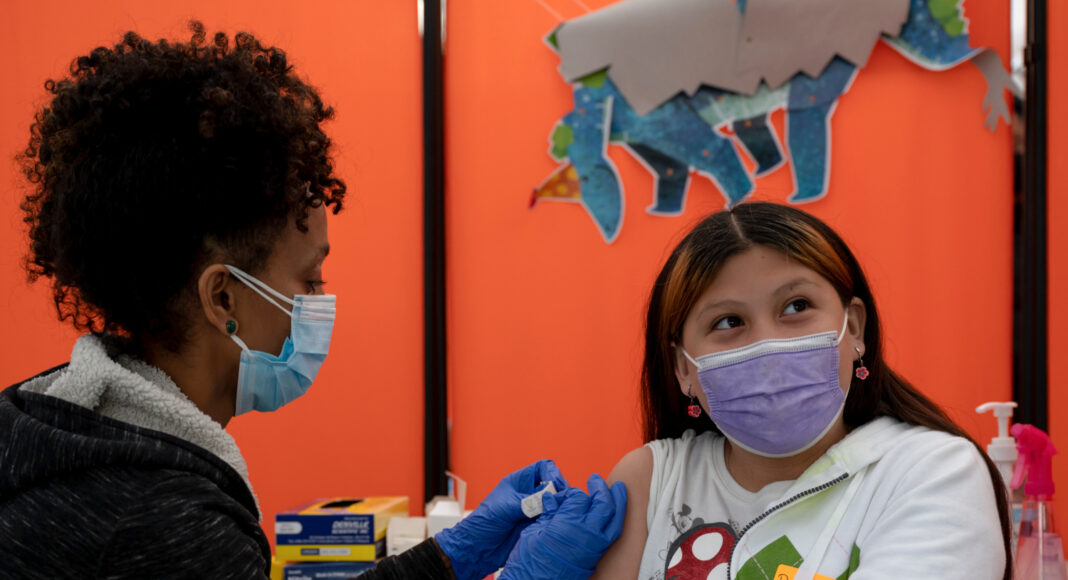A booster shot of the coronavirus vaccine made by Pfizer-BioNTech increased the level of neutralizing antibodies against both the original version of the virus and the omicron variant in a small trial of children age 5 to 11, the companies announced on Thursday.
If the companies’ claims of a strong immune response pass muster with federal regulators, the government could broaden eligibility for booster doses to include 28 million more children.
The study by Pfizer and BioNTech, which the companies described in a brief news release, included 140 children who received a booster six months after their second shot.
The children showed a sixfold increase in antibody levels against the original version of the virus one month after receiving the booster, compared with one month after receiving a second dose. Laboratory tests of blood samples from a subgroup of 30 children also showed 36 times the level of neutralizing antibodies against the omicron variant compared with levels after only two doses, according to the news release and a Pfizer spokeswoman.
The study did not show how long the antibodies last, or test effectiveness against COVID. The data was not published or peer-reviewed.
Antibodies are the immune system’s first line of defense against infection. They are expected to rise after an additional dose; how rapidly that protection wanes has been an enduring concern for vaccine experts, regulators and manufacturers.
The companies said they would ask the Food and Drug Administration for emergency authorization of a booster for 5- to 11-year-olds “in the coming days.” The agency has typically acted within a month of receiving such requests.
Currently, Americans 12 and older are eligible for at least one booster, and about 30 million people age 50 or older are eligible for a second one. Studies suggest that 5- to 11-year-olds may particularly need a booster.
Researchers in New York state recently found that while two Pfizer shots protected children in that age group from serious illness, they provided virtually no protection against symptomatic infection, even just a month after full immunization.
“I think a bottom line is that in order to protect from the omicron, we know from studies and from adults and adolescents that you need three doses,” said Dr. Kathryn M. Edwards, a pediatric vaccine expert at Vanderbilt University School of Medicine. “So I think the FDA will likely approve the third dose for the 5- to 11-year-olds.”
The companies’ announcement comes as new U.S. virus cases are again ticking up slightly after two months of sustained declines. The upswing has been particularly noticeable in the Northeast, where the omicron subvariant known as BA.2, now the dominant version of the virus in the United States, first took hold.
Dr. Anthony Fauci, President Joe Biden’s chief medical adviser, warned in recent days that the nation could see a significant increase in infections over the next several weeks. But he has said the rates of hospitalizations are unlikely to rise in tandem because so many Americans have a degree of immunity, either from vaccines or prior infections.
Several hundred children age 5 to 11 have died of COVID since the pandemic began, according to the Centers for Disease Control and Prevention, but pediatric shots have been a hard sell for many parents. Only about 28% of children in that age group have received two doses and would be eligible for a booster. Roughly 7% have received just one dose, the agency’s data shows.
There was an initial rush for shots after they were first offered for that age group in November, but the increase in the vaccination rate then slowed to a crawl.
Edwards said some parents feel that the chances are low that their children will get seriously ill, while the shots are an unknown. She said some research indicates that 45% of children who get infected have no symptoms at all.
“The problem is that we can’t predict who is going to get sick and who is not,” she said. And among those who do, “there will be kids that are going to be hospitalized, and there will be a few deaths.”
The share of children age 5 to 11 with at least one dose varies starkly by region, according to a study by the Kaiser Family Foundation. Five of the top 10 states with the highest vaccination rates were in New England, while eight out of the 10 states with the lowest rates were in the South.
The study done by New York researchers, posted online in late February, found that for children age 5 to 11, the Pfizer vaccine’s effectiveness against infection fell to 12% from 68% within 28 to 34 days after the second dose. That was a steeper decline than for older adolescents and teens who received a much stronger dose.
Another study by the CDC stated that two Pfizer doses reduced the risk of omicron infection by 31% among those ages 5 to 11, compared with a 59% reduction in risk among those ages 12 to 15.
Pfizer’s vaccine is so far the only one authorized for those younger than 18.
This article originally appeared in The New York Times.












